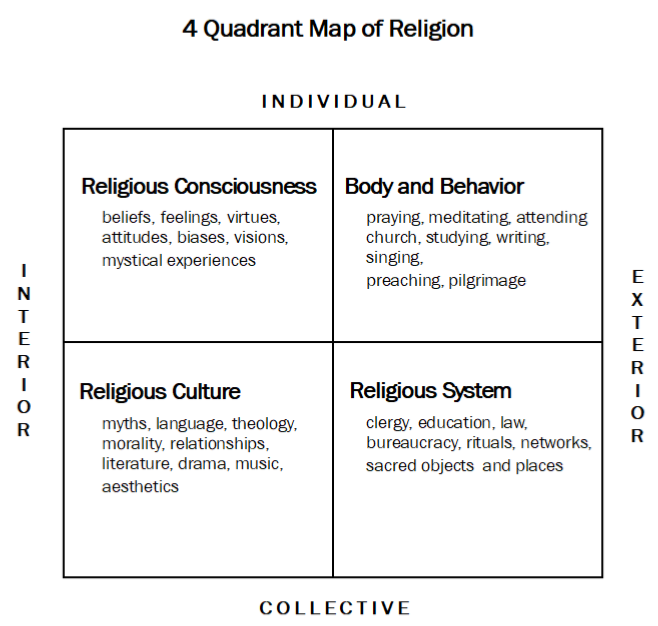Ken Wilber’s new book Finding Radical Wholeness has been published, and I have carefully read the first few chapters. My high expectations for the book have not been disappointed, and I look forward to participating in a book study with two close friends. However, I feel compelled to comment on a particular phrase in the book that is starting to look like a cornerstone idea, namely “spiritual not religious.” Ken makes much of the phrase, even making it the title of an entire section in Chapter 4. This is unfortunate.
As I have argued elsewhere (see my essay “What Is Religion?” here), an integralist should never use the phrase ’spiritual not religious.’ First, it sets up an invidious hierarchy of spiritual higher, religious lower. Ken works hard to mitigate this implication, but the impression is hard to avoid that IT holds that spirituality is better than religion. Not a good look.
Secondly, the phrase seems to imply that people who practice a traditional religion (magic or mythic) do not have a spiritual life. IT insists, of course, that folks whose center of gravity in their spiritual intelligence line is at amber or lower can have a Waking Up experience of Oneness with all things, Nirvana, Emptiness, the Supreme Identity, or satori. But that will be scant comfort to traditional Christians, Muslims, Hindus, etc., who believe that their commitment to mythic beliefs, rituals, and community are spiritual in their own right, that is, deeply held and emotionally felt aspects of their ultimate concerns. The notion that their Growing Up is not spiritual will be upsetting.
So how should we think about the terms ‘spiritual’ and ‘religious’? Both have to do with a person’s ultimate concerns. In most contexts, therefore, they should be regarded as synonyms, as Ken himself does in some of his works (see Integral Spirituality, p. 102) For example, he often refers to James Fowler’s “Faith Development” as religious development or spiritual development. I see no harm in doing so and a positive benefit in avoiding the invidious hierarchy. Everyone goes through 6 or 8 stages of religious/spiritual/faith development. As Wilber explains in The Religion of Tomorrow and elsewhere, there is magic religion, mythic religion, rational religion, pluralist religion, integral religion, and transpersonal religion. Substitute the word ‘spirituality,’ and you get the same result: an unfolding through several stages of an individual’s understanding of their ultimate concerns.
Here’s another point. You can’t have spiritual intelligence without spirituality. If we are going to say that everyone has a spiritual line of development or spiritual intelligence consisting of 6 or 8 stages, we are already conceding that there is spirituality at each of those stages, including the magic and mythic. If you insist on ’spiritual, not religious,’ then your spectrum should read something like “magic religion, mythic religion, rational religion, postmodern spirituality, integral spirituality, transpersonal spirituality." But that makes a mess of the whole scheme, and it is entirely unnecessary. Get rid of ‘spiritual not religious’ and these problems disappear.
